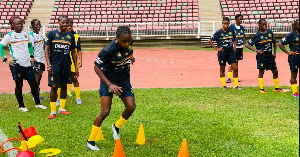Liberian soldiers have set up a blockade stopping people from western regions affected by the Ebola outbreak from entering the capital, Monrovia.
It follows the president's declaration of a state of emergency to tackle the outbreak that has killed more than 930 people in West Africa this year.
In Sierra Leone the security forces have now imposed a complete blockade of eastern areas hit by Ebola.
Health experts in Switzerland are discussing a response to the outbreak.
It is the world's deadliest outbreak and the two-day World Health Organization (WHO) meeting will decide whether to declare a global health emergency.
Ebola, a viral haemorrhagic fever, is one of the deadliest diseases known to humans, with a fatality rate in this outbreak of between 50% and 60%. It is spread through contact with the bodily fluids of Ebola patients showing symptoms.
Already reports are reaching Monrovia that a military blockade is stopping people from western regions of Grand Cape Mount and Bomi, where Ebola is prevalent, from entering the capital.
These counties largely rely on Monrovia for their goods - and the blockade means that the cities of Robertsport and Tubmanburg are now cut off. One Tubmanburg resident phoned into a radio show to complain that rice, the national staple, was already in short supply in the market.
The head of the National Health Workers Association said while the state of emergency was necessary, people should have been given time to prepare. Fear has prompted hospital workers to abandon clinics - meaning many are now shut.
President Sirleaf said this meant many diseases prevalent during the rainy season, such as malaria and typhoid, were going untreated and there could be unnecessary and preventable deaths as a result.
Announcing a state of emergency for 90 days, President Sirleaf said the government and people of Liberia required "extraordinary measures for the very survival of our state and for the protection of the lives of our people".
Speaking from a crossroads 37km (23 miles) west of Monrovia, the BBC's Jonathan Paye-Layleh said soldiers had been deployed to stop the movement of people - many of whom are traders.
In neighbouring Sierra Leone, the head of the police in the east of the country said police and soldiers had imposed a "complete blockade" of the Kenema and Kailahun districts.
"No vehicles or persons will be allowed in or out of the districts" except those with essential food and medicines, he said.
In other developments:
In Nigeria, where there have been two deadly Ebola cases, the medical association called off a national strike which began more than a month ago over the outbreak
A Spanish priest who contracted Ebola while working in a hospital in Liberia was flown back to Spain for treatment, along with a nun who is to be isolated in case of infection
The WHO said it would convene a meeting of medical ethics specialists next week to decide whether to approve experimental treatment for Ebola
Infos Santé of Thursday, 7 August 2014
Source: bbc.com













